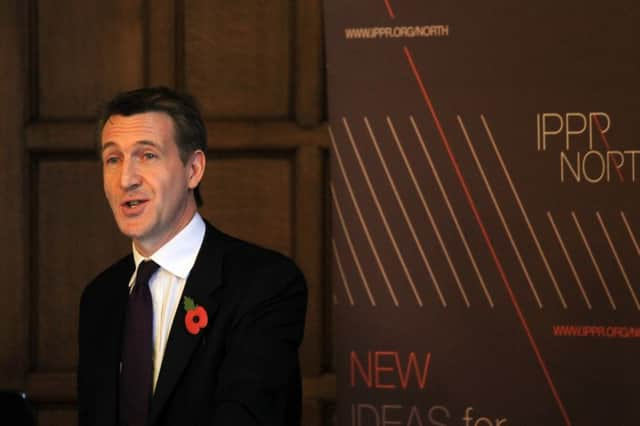Yorkshire MP questions Ministers' strategy on Northern schools as new report calls for action and funding


The Institute for Public Policy Research (IPPR) North and Teach First has produced a new report calling for extra funding for schools in the North.
It sets out how schools in the North of England face a greater challenge than those elsewhere because of their intakes yet receive less cash per pupil than those in London. And it says that addressing school standards must be at the heart of efforts to build a Northern Powerhouse.
Advertisement
Hide AdAdvertisement
Hide AdEd Cox, director of IPPR North, said: “Getting a great start through great education is essential in training the engineers, scientists and doctors that will power the northern powerhouse.
“There should be no excuses for low-expectations of pupils’ potential. But nor should there be excuses on why schools in the North continually lose out because the funding system is skewed by the capital’s living costs.”
Lord Jim O’Neill, Commercial Secretary to the Treasury said: “This report clearly highlights the disparities in education performance between the north and the rest of the country. We agree with the report that tackling underperformance is critical to the productivity and growth of the Northern Powerhouse and that’s why we have placed education and skills at the heart of our plan, including £20 million a year of new investment in a Northern Powerhouse Schools Strategy.”
However Barnsley MP Dan Jarvis has questioned this. He said: “This report clearly shows that when it comes to schooling the north is being let down. It is unacceptable that secondary schools in the north receive £1,300 less per pupil than schools in London. The government announced a Northern Powerhouse Schools Strategy in their Budget back in March but to my disappointment this has so far proved more spin than substance.
Advertisement
Hide AdAdvertisement
Hide Ad“I have pressed the government a number of times on this issue in Parliament and they must now take firmer action, including addressing funding disparities, to improve schools across the north.”
In a parliamentary debate on raising attainment in Yorkshire last month Mr Jarvis highlighted that the strategy was not mentioned at all in the Government’s education White Paper. The Government has said that Bradford-based Dixons Academies chain boss Sir Nick Weller is to lead work on improving schools in the North.
The IPPR and Teach First report is being published to mark the 10th anniversary of the teaching charity working in the North West. It shows how educational inequalities start before children reach school age, with the gap between children from poor and wealthy homes almost twice as large in the North as in London.
Primary schools in the North perform in line with the England average, but in Yorkshire they lag behind. It also says secondary schools are a big concern.
Advertisement
Hide AdAdvertisement
Hide AdAcross the North, 55.5 per cent of pupils attain five good GCSEs including English and maths, compared with 57.3 per cent across England, and 60.9 per cent in London. Among disadvantaged children, only 34 per cent achieve the five good GCSEs benchmark in the north of England, compared with a national average of 36.8 per cent and 48.3 per cent in London.
Even in northern schools rated outstanding by Ofsted there is a gap of 22 percentage points between pupils on free school meals and their better-off peers.
And it says the North East and Yorkshire and the Humber perform particularly badly in terms of the size of the attainment gap.
Russell Hobby, general secretary of school leaders’ union NAHT, said:“School leaders have been pointing out the disparity in school funding which currently exists across the UK for a long time, and have campaigned to secure a fair funding formula for all schools. This report highlights that disparity and drives home the impact it has on life chances.
Advertisement
Hide AdAdvertisement
Hide Ad“The ‘early years gap’ is particularly concerning as a child’s life chances are heavily influenced in the first five years of life. In recognition of the importance of this phase of education, the early years pupil premium should increase to reach parity with that for primary pupils.
“The success London has had in narrowing the attainment gap for disadvantaged pupils over the last decade proves that increased funding is important. Proper funding will enable schools in disadvantaged or remote areas to attract and retain high-quality teachers and leaders.
“It is vital, however, that any future agreement on a National Funding Formula should result in a general uplift of the amount of funding received by all schools. The current government funding commitment is in cash terms only. Inflation and extra costs will mean a real terms cut in the actual value of funding per pupil of eight per cent over the next four years. Schools budgets are at breaking point. If we are to make true progress in narrowing the attainment gap between advantaged and disadvantaged children in all regions, the government must commit to sufficient as well as fair funding for all schools.”